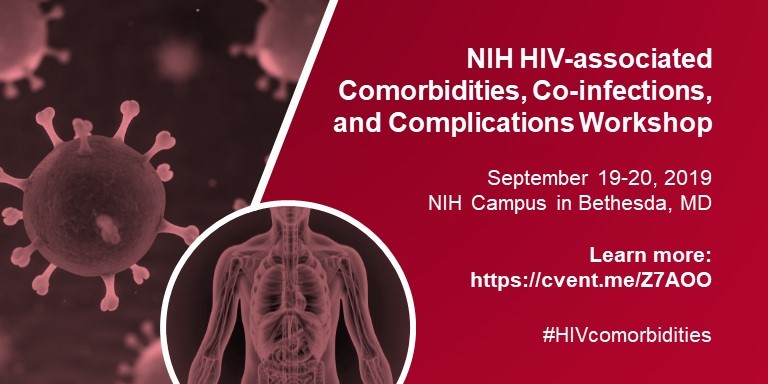NIH Workshop on HIV-Associated Comorbidities, Coinfections, and Complications
 The National Heart, Lung and Blood Institute (NHLBI) and the Office of AIDS Research (OAR) co-sponsored a National Institutes of Health (NIH) Workshop on HIV-Associated Comorbidities, Coinfections and Complications (CCCs). The event took place in the Natcher Auditorium at the NIH Campus on September 19-20, 2019.
The National Heart, Lung and Blood Institute (NHLBI) and the Office of AIDS Research (OAR) co-sponsored a National Institutes of Health (NIH) Workshop on HIV-Associated Comorbidities, Coinfections and Complications (CCCs). The event took place in the Natcher Auditorium at the NIH Campus on September 19-20, 2019.
Organized in collaboration with 19 other Institutes, Centers and Offices (ICOs), this workshop was designed to foster a better understanding of HIV-associated CCCs and to identify scientific opportunities in this important NIH HIV priority research area.
Although people with HIV can now live nearly normal lifespans because of significant progress in HIV treatment, the quality of their lives may be severely impacted by multiple, concurrent HIV-related CCCs. This makes it imperative for the NIH and the scientific community at large to continue investing in additional efforts and research to better understand the overlapping etiologies and consequences of HIV-associated conditions on a holistic level. To that effect, OAR plays a vital role by funding research on HIV-associated CCCs through multiple ICOs, focusing on diseases that fall within each ICO’s mission and HIV/AIDS related funding priorities, as well as encouraging collaboration among them to pursue shared scientific interests.
Chaired by Dr. Steven Deeks from the University of California, San Francisco (UCSF) and Dr. Savita Pahwa from the University of Miami, the workshop fostered discussions among experts from different fields and disciplines who shared their perspectives and explored interrelationships among multiple comorbidities, in an effort to refine research priorities that aim to improve the health and well-being of people with HIV.
During this event, Dr. Deeks highlighted the fact that lifespan may be approaching normal for people with HIV but “healthspan” is not, reflecting limited capacity of the healthcare system to care for aging persons with HIV, particularly those with multimorbidity. He also highlighted the need to continue supporting research to help understand the long-term consequences of chronic HIV infection and summarized key issues presented by the five working groups:
- More patient-centered study approaches are essential;
- Multidisciplinary approaches to study healthy aging are needed;
- Enhanced collaborations are essential to create more synergy between social and biomedical sciences, including disease specialists, anthropologists, and social and behavioral scientists;
- Social determinants of HIV must be fully quantified and integrated into cohort studies and clinical trials; and
- people with HIV must be included in non-HIV-focused studies.
The working groups also suggested the need to implement a coordinated NIH-wide research strategy to address HIV-associated CCCs because these involve multiple organ systems and concurrent conditions that may share common biological and/or physiological pathways. Furthermore, multidisciplinary strategies will foster a non-siloed approach to HIV research through collaborative efforts. Examples of areas that would benefit from multidisciplinary collaborative efforts include:
- Underlying pathogenesis and mechanisms that may be shared among HIV-associated CCCs but may be fundamentally different from the same “diagnosis” in people without HIV;
- Syndemics research to characterize and integrate various comorbid diseases/disorders and their synergistic effects in people with HIV, while considering social, political, and ecological factors;
- Implementation Science research, as a relatively new area of scientific inquiry, requires coordinated support to develop new observational and experimental implementation research designs and training; and
- Prevention and management of HIV-associated CCCs should include targeted interventions that are tested for safety and effectiveness in people with HIV.
Working groups continue to discuss regularly the current state of the research and help identify scientific gaps, challenges, and opportunities within their specific areas. Information on these working groups and related funding opportunities announcements can be found at https://web.cvent.com/event/21d7c8f1-9e43-4df6-8a7e-10f69a5f99cf/websitePage:4f073a49-1c8d-4e9e-a89b-a54b6e610e71
Recordings from the workshop can be found in the webcast links below for each day:
- September 19 (Day 1): https://videocast.nih.gov/summary.asp?live=34700
- September 20 (Day 2): https://videocast.nih.gov/summary.asp?live=34701
Maureen M. Goodenow, Ph.D.
Associate Director for AIDS Research and
Director, Office of AIDS Research
National Institutes of Health
This page last reviewed on December 10, 2024

